Daytona Beach orders two church food pantries to close immediately. Here's why.
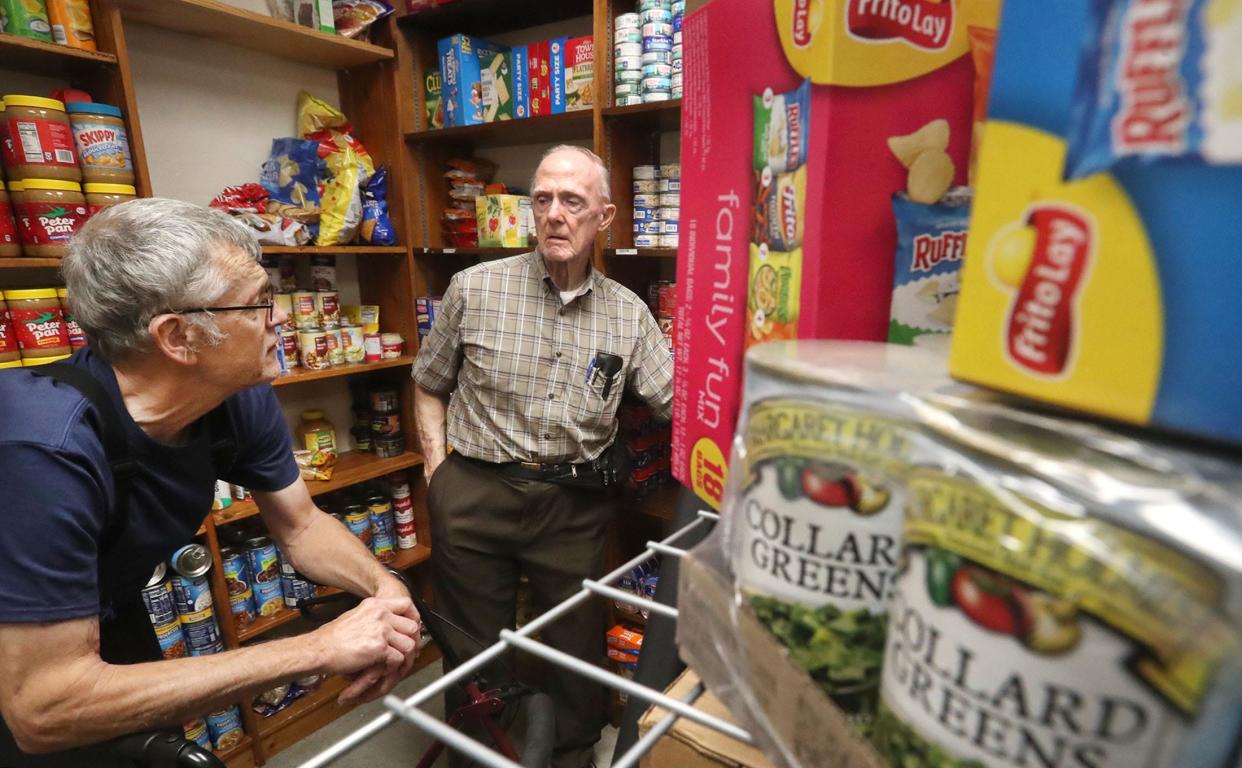
DAYTONA BEACH — For years, downtown residents who have had trouble getting to a grocery store and can't afford much when they do shop have found vital sustenance at churches on Live Oak and Palmetto avenues.
First Christian Church and Seventh Day Baptist Church are tucked away on side streets within the city's historic center, and they have tiny congregations. But their food pantries have been indispensable to dozens of impoverished and elderly downtown residents who don't drive or have enough money to cover a typical grocery bill.
When the city ordered both pantries to shut down last month on charges they weren't allowed in the quiet neighborhood just west of the Halifax River, some pantry regulars were left with rapidly emptying cupboards and refrigerators at home.
Thanks to the pro bono help of a longtime local attorney whose law office building is in the middle of the two churches, the city decided this week First Christian Church can resume its food pantry distributions immediately. The situation for Seventh Day Baptist Church is more complicated since its food pantry hasn't been open as long, but attorney Chobee Ebbets is hopeful he can lock in an agreement with the city to get that parish's small pantry up and running again soon, too.
"Today I saw people with carts turned away," said Ebbets, whose law office is in a 113-year-old coquina house next door to Seventh Day Baptist Church.
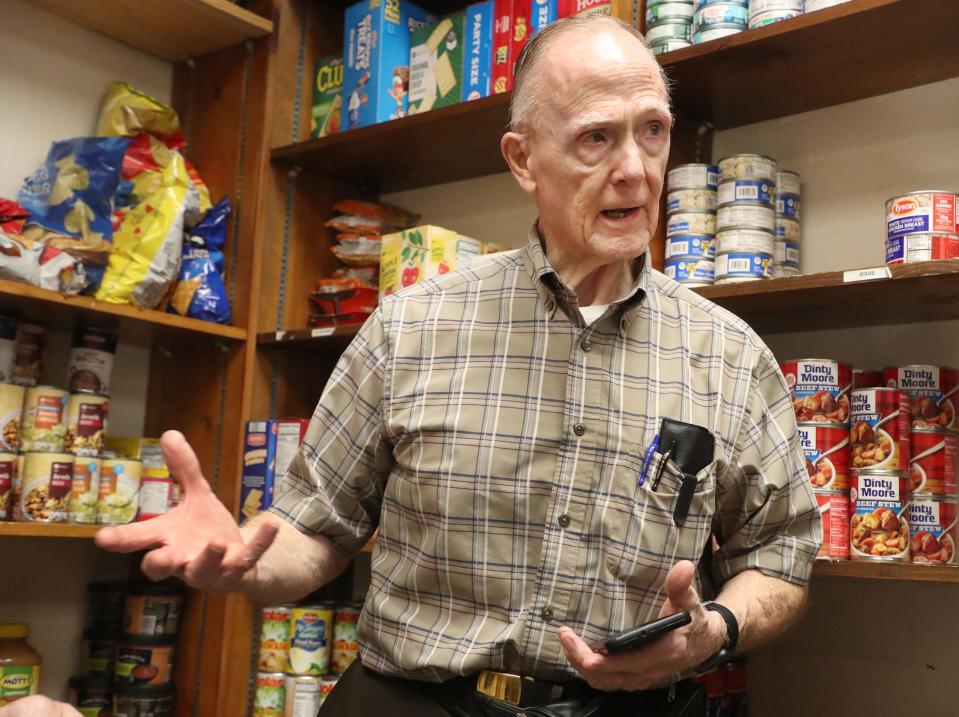
Ebbets doesn't want to see anyone else sadly walking back home with an empty cart or bag. He said he'll sue the city if it doesn't allow the Seventh Day Baptist Church pantry to reopen soon — and without penalty.
First Ebbets is trying to get the city to lift the current mandate for the Baptist church to appear before a special magistrate Tuesday morning on accusations the congregation has been violating city code with its food pantry giveaways.
The church at 128 Live Oak Ave. was cited by a city code enforcement officer on Oct. 13, ordered to shut down the pantry immediately, and instructed to appear before the magistrate at City Hall next week.
The special magistrate could levy fines of up to $1,000 per day for a first violation, $5,000 per day for a repeat violation, and $15,000 per violation if the magistrate finds the violation to be irreparable or irreversible. A lien could also be recorded against the church property.
Ewald Fick, president of Seventh Day Baptist Church, is baffled by the situation. But he hasn't lost hope.
"God is the one in control," Fick said. "We do our part, and God does the rest of it."
Why would the city shut down a church food pantry?
Both churches are located in Daytona Beach's Downtown Community Redevelopment Area, which extends from Fairview Avenue to South Street. The CRA is bordered to the west by railroad tracks and to the east by the Halifax River.
The city's four other redevelopment areas are in the Midtown neighborhood, around Ballough Road, and on the beachside between Oakridge Boulevard and Bostwick Avenue.
For more than 10 years, city code has prohibited food pantries at a place of worship in any of Daytona's five redevelopment areas.
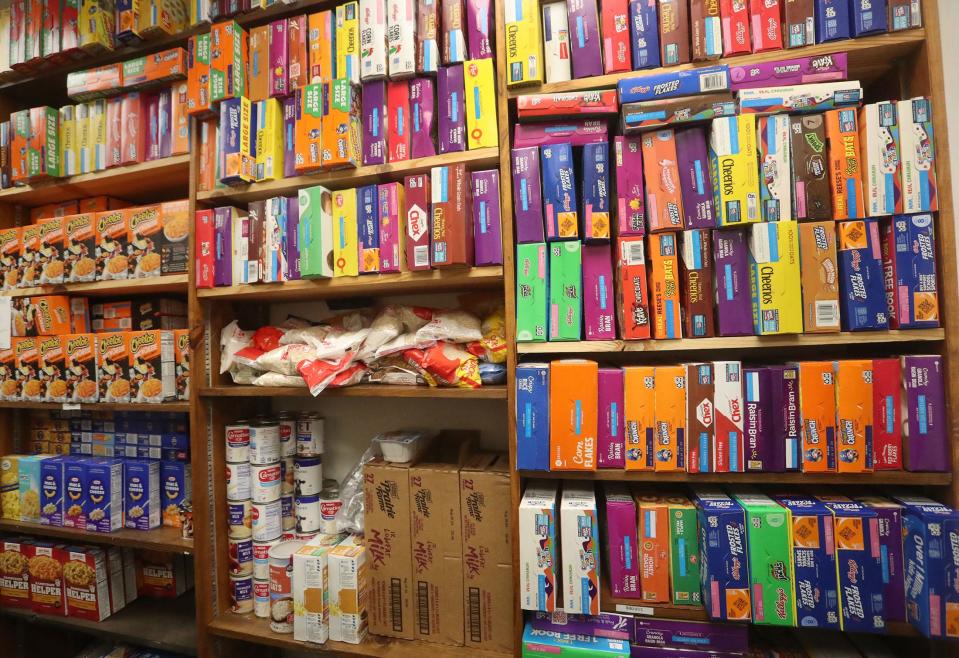
The city defines a food pantry as a place that acquires food through donations, food bank programs or purchases, and distributes the food to individuals but does not provide prepared meals for consumption on or off site.
Congregate meal facilities that prepare and serve food onsite, homeless shelters and homeless services facilities are also illegal in the redevelopment areas.
The city does make an exception for food pantries that were legally established as an accessory use prior to July 20, 2011. In August 2011, city commissioners passed an ordinance that prohibited new food pantries in all redevelopment areas.
City officials have said they banned food pantries in redevelopment areas because their presence can be detrimental to the difficult task of reviving a struggling area. A facility on the northwest corner of Ridgewood Avenue and North Street that for decades provided an array of help for homeless people and offered free lunches every day spurred nearly constant loitering, people sleeping outside near the assistance center, drug sales and an array of crime.
Daytona Beach does allow food pantries as an accessory use to places of worship that are not located within a redevelopment area.
Food banks, which store and distribute donated food to nonprofit organizations, are not barred from locating in redevelopment areas.
The difference between food pantries and food banks "is the level of impact on the site, and possible negative impacts in surrounding neighborhoods," said Rose Askew, a growth management and project planning manager for the city.
"Because of the greater negative impacts that food pantries could cause in comparison to food banks, it was determined that prohibiting food pantries was needed to further redevelopment goals," she said.
Doing 'what Jesus told us to do'
First Christian Church was established in 1901 in a house on Beach Street. As the congregation grew, the church relocated in 1918 to its current site at 326 S. Palmetto Ave. The current sanctuary on the site was built in 1986.
The church is located right next to City Hall, just south of the local government building's parking lot.
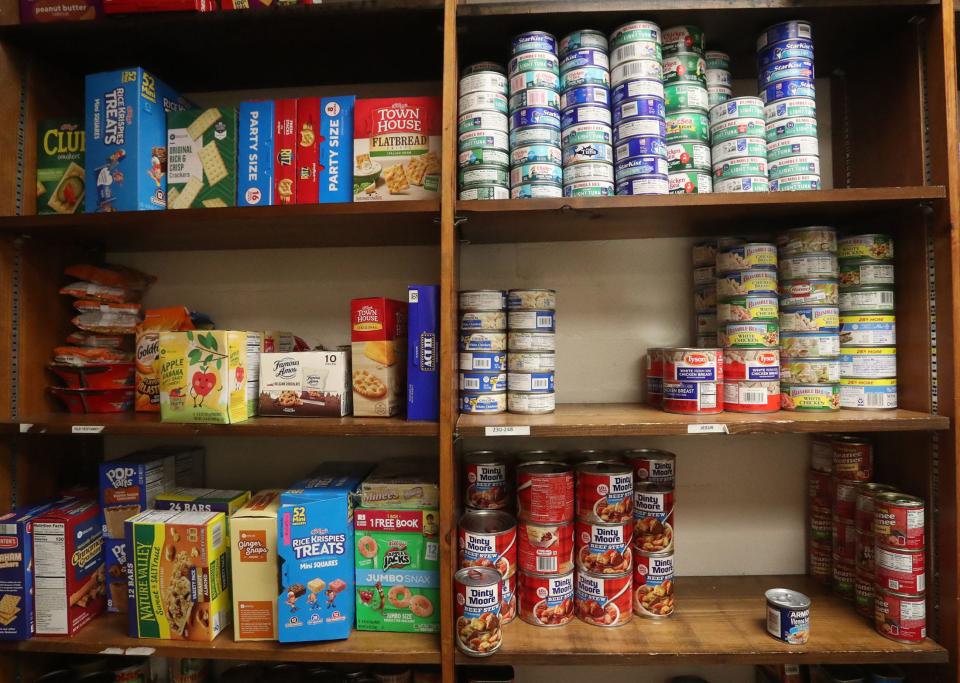
The Rev. David Troxler became the congregation's pastor in 1995, and the church food pantry opened in 2010. The pantry was grandfathered in when the city changed the law about food pantries in redevelopment areas in 2011, so it's not clear why First Christian Church was hit with a code violation, and why that happened now.
The church makes no secret of what it calls the Good Samaritan Food Pantry, which operates out of a small storage room and is supplied largely by Second Harvest Food Bank. The pantry is publicized on the church's website, and it's open the third and fourth Fridays of every month from 11 a.m. to 1 p.m.
The shelves are jammed full of cereal, canned vegetables, peanut butter, tuna, soup, macaroni, crackers, granola bars and coffee. Everyone who comes to the pantry gets a free bag full of groceries. No one is asked to prove financial need.
About 80-100 people come for the free food every time it's available, Troxler said. Most are older, financially struggling people who live in nearby low-income housing. Only about 2% are homeless, he said.
Troxler was shocked when the city shut down his pantry Oct. 27. He had no idea the city prohibition existed, and he'd never been warned by the city officials across the parking lot he was doing anything wrong.
The pastor was also saddened that a government entity could block him from helping the needy.
"We're trying to do what Jesus told us to do," Troxler said. "We serve God and spread love. It's who we are."
'There's a great need there'
Seventh Day Baptist Church, founded in 1884, used to worship on property that's now become part of the site occupied by the new Brown & Brown insurance brokerage headquarters on north Beach Street. The church had a food pantry on that site on the north end of the Downtown Redevelopment Area since 2009, long enough that it was grandfathered in when city code changed 12 years ago.
When church leaders agreed to move in 2019 to allow the Brown & Brown office tower to be built, they didn't realize they would lose permission to operate a food pantry in their new location several blocks to the south in a 1920s mansion on Live Oak Avenue.
They normally let about 70 people of all ages come into their pantry every Wednesday morning and choose what they need.
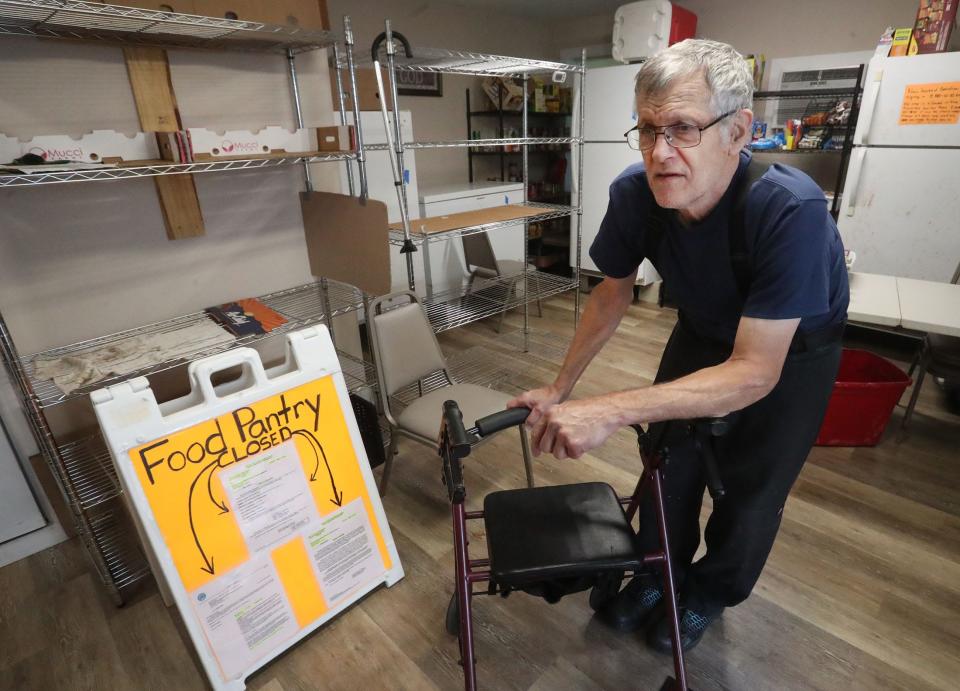
Ebbets said he's confident the pantry ban in redevelopment areas is unconstitutional, and he said he will sue the city if Seventh Day Baptist isn't allowed to reopen its pantry.
He's trying to avoid legal action, and he's been talking to city attorneys and the city manager.
In a letter sent to City Attorney Ben Gross on Monday, Ebbets wrote that the code addressing church food pantries in redevelopment areas is "over broad, arbitrary, and unenforceable," and federal law protects the food distribution.
The city has said it cited the two churches because of a complaint from someone who lives near the houses of worship alleging the Seventh Day Baptist food pantry was creating problems.
"Never in the seven years that I have been here has the food pantry presented any problem or created any form of public nuisance," Ebbets wrote in his letter. "It is organized, quiet and efficient."
The people who go to the pantry for food are "nothing but kind and orderly," Ebbets said in an interview with The News-Journal. Troxler said one man who comes to his pantry has some mental health issues, but he has never had a problem with him.
If the city doesn't notify the Baptist church within the next few days that it can restart its pantry operation next week, Ebbets said he'll file a Petition for Declaratory Relief and Emergency Injunction on Monday.
City officials have told Ebbets they might consider revising the ordinance to specify certain operating hours for pantries and traffic or pedestrian control limitations. But that would require City Commission approval, and would take weeks to be enacted.
"While I appreciate the city’s willingness to look for a compromise, at this point it is urgent to get the food distributed to those who need it and and who have come to expect it," Ebbets said in the letter.
New Daytona homeless veterans shelter: Rekindling hope: New Daytona veterans shelter to provide a path to a happier, stable life
Billie Lynch, a member of First Christian Church for 24 years, is dismayed by what's been happening with the two church pantries.
"I just feel very strongly this is an injustice to a portion of the population who need to be taken care of," Lynch said. "Christ asked us to feed his sheep. We take that literally and figuratively."
She said the area around First Christian Church and Seventh Day Baptist Church is a food desert.
"There's a great need there," Lynch said. "We're helping people to survive."
You can reach Eileen at Eileen.Zaffiro@news-jrnl.com
This article originally appeared on The Daytona Beach News-Journal: Daytona Beach church food pantries hit with city code violations

